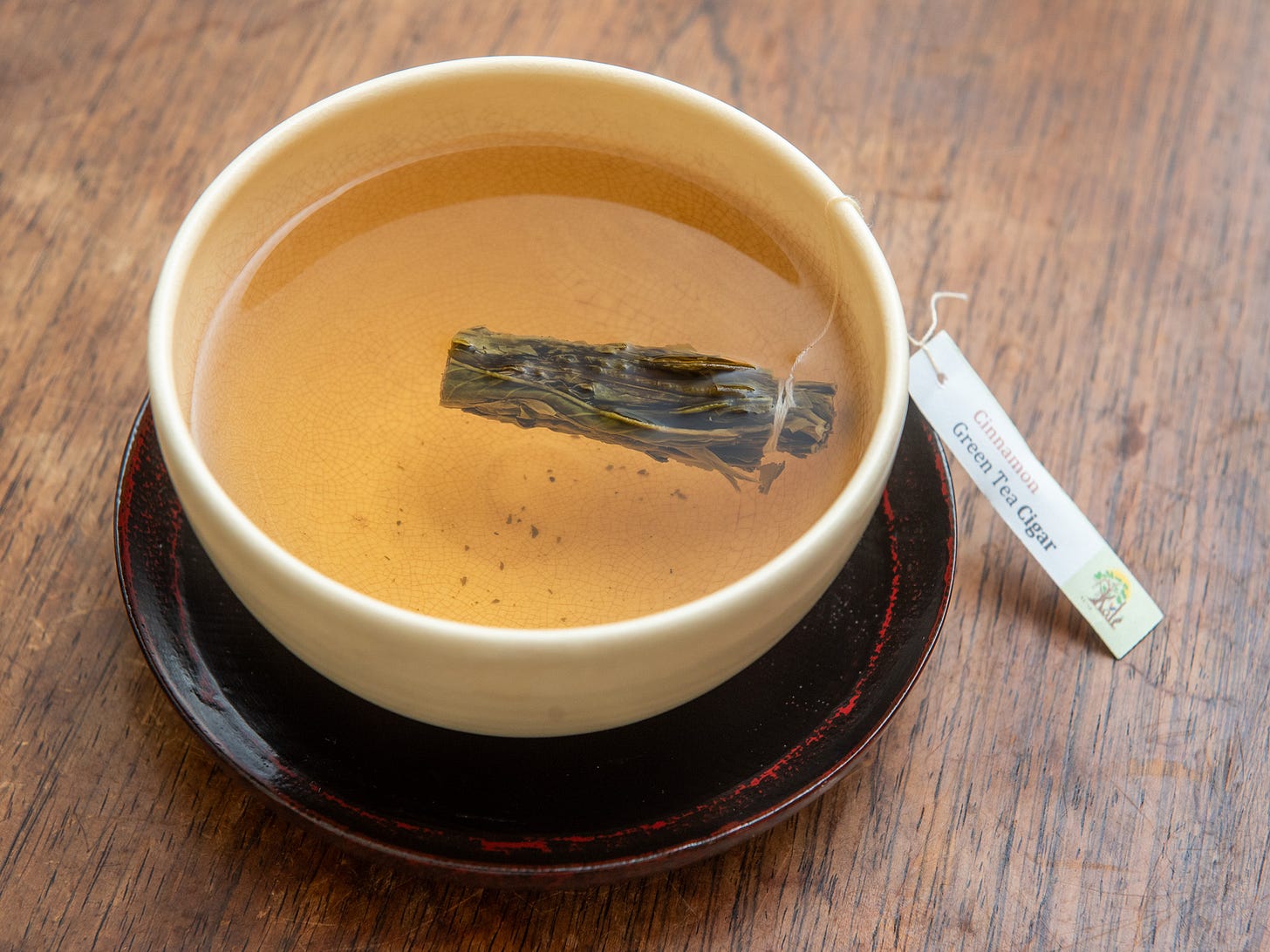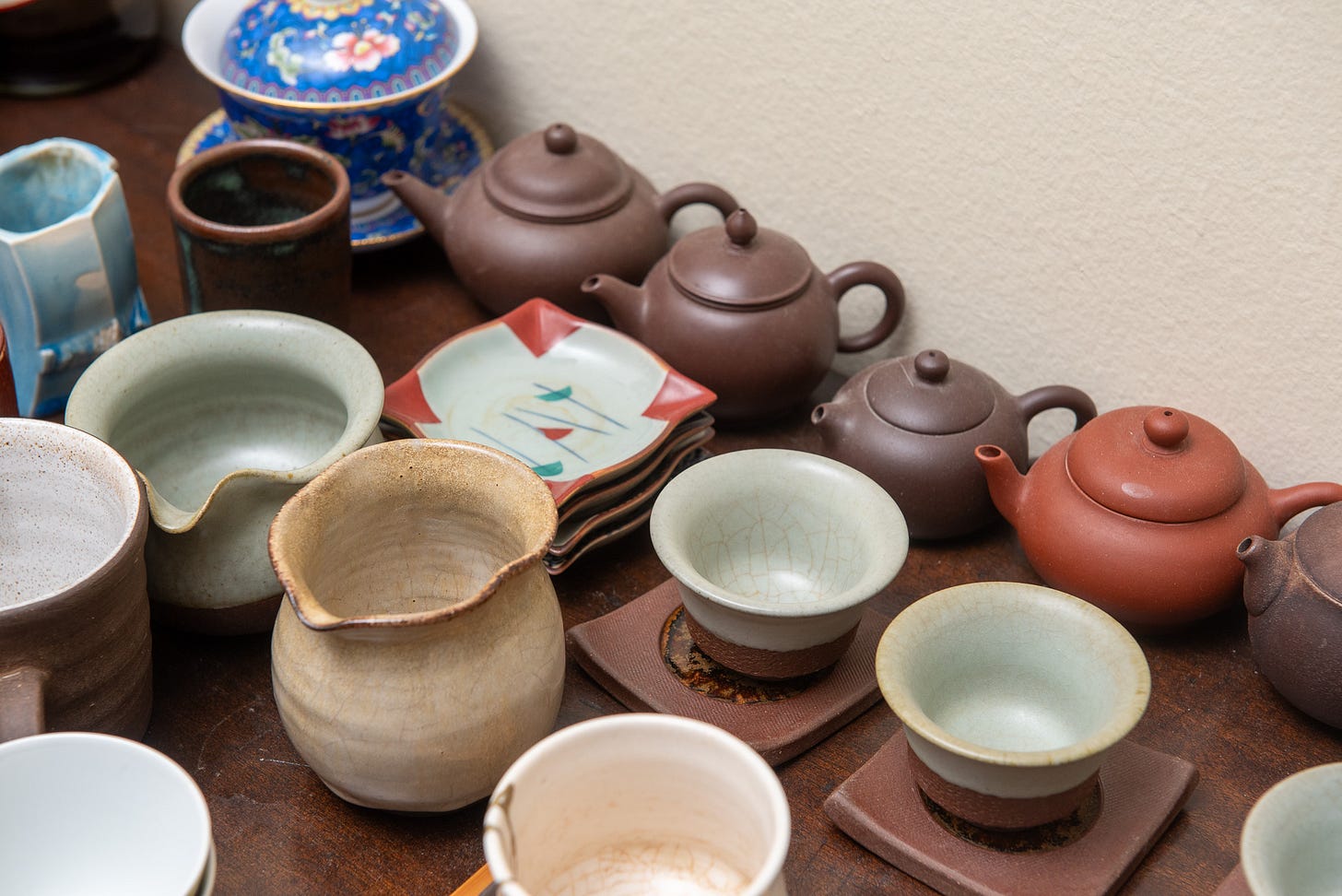How to find good teaware
Green tea tinged with cinnamon + a buyer’s guide to teapots and cups.
Sometimes a cigar is made of tea
The tea: Kaley green tea cinnamon leaf cigars, sold by The Steeping Room. $6 for 3 cigars.
Here’s a teabag alternative I could get behind: green tea scented with cinnamon leaves and tied into a neat bundle. Dunk the cigar in a mug of hot water and drink away. You get some leaf breakage in the cup but it’s eminently satisfying to toss this bundle in the compost and know it’ll actually become compost. (Looking at you, PLA teabags.) For those wise to the pleasures of keeping pet rats, you could also dry out the steeped bundle and stick a twig in the end to make little broomsticks for your friends to fly.
Cinnamon leaves—called Indian bay leaves in some culinary contexts—have a gentle cinnamon fragrance with a vanilla-like flavor that leans into bubble gum. They’re a good match for this rustic steamed and pan-fired tea made with relatively large leaves; the two mellow plants reinforce each others’ subtleties. At $2 a cigar—two to four times the cost of a typical premium teabag—you’re definitely paying for novelty value. But it’s a fair price for the painstaking labor of vertically aligning tea shoots into neat bundles. Innovative form factors—ones that benefit the drinker, anyway—should be rewarded.
The source: The Steeping Room in Austin carries an interesting and eclectic collection from spice-scented teas like this one to some reputable puer. They get these cigars from Kaley Tea, a small Sri Lankan garden that’s converting a conventional tea field into a regenerative agroforest. Tea plants are interspersed with shade trees, ground cover, and fruit and spice crops. These practices increase soil biomass and local biodiversity, which result in healthier and tastier tea plants in the long run. Sri Lanka’s tea industry is dominated by sprawling commodity fields. A small farm like Kaley can never compete on scale, so creative teas and farming methods are crucial to stand out in the market.
To brew: Go ahead and use full boiling water for this green tea. The leaves can take it and higher temperatures help them unfurl. The base tea reminds me of a milder gunpowder that trades in roasted flavors for a soft vegetal character. It lacks punch or the distinctive lubricating quality of a higher end green, but it doesn’t get bitter or astringent as it sits, making it perfect to casually sip all afternoon. The first time I sampled this tea was after a day of drinking certified bangers with tea friends. My head was spinning with impressions of a 20-year-old silver needle. Yet even this rustic, humble brew raised my eyebrows with a smooth and refreshing sweetness that coated my throat. A moment of peace amid overstimulation—that’s what good tea can do.
A drinker’s guide to buying teaware
If this newsletter has made the case for anything, I hope it’s that tea can be a practice that’s deeply personal and idiosyncratic. The truth is that I can’t tell you what teaware to buy because I don’t know what teas you like or how you like to drink them. This isn’t the Wirecutter. Some choices can’t be ranked and ajudicated. They can only be experienced.
Beyond the nuts and bolts of how they brew or hold tea, teawares are pieces of functional art. The rustic, blocky styles I like would look out of place in a mod, minimalist home. The rim flare of an individual cup may or may not conform comfortably to the shape of your lips. While there are best practices to keep in mind, finding good teaware—arguably even more than finding good tea—requires a personal point of view.
What I can do is show you the teawares I own and why I own them. Some may fit the way you drink tea. Or they won’t, but my rationale might help you make your own choices. I think of good teaware like comic books. Find one that speaks to you and enjoy it while it’s here. Like comics, your definition of good teaware may change over time. You can always sell off or give away a piece that doesn’t meet your needs anymore; budding drinkers will appreciate the bargain and you’ll enjoy seeing the longevity of a tool that served you well for a while. I’ve lost track of how many pots and cups I’ve rotated through my collection.
All that said, maybe you just want me to shut up and recommend a basic teapot. If you’re looking for a Wirecutter answer, let’s start with the piece I suggest to everyone.
Keep reading with a 7-day free trial
Subscribe to Leafhopper to keep reading this post and get 7 days of free access to the full post archives.








